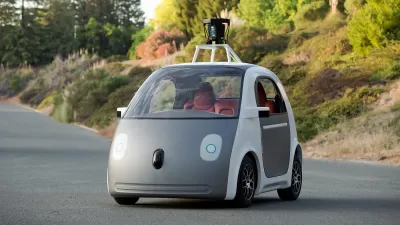All of a sudden, the viability of driverless cars seems to be on the rise. It's a worrying notion for anyone skeptical about technology. And yet, this advancement may help cities regain the charm and vibrancy they lost in the automobile age.

If you have never been a 7-year-old boy watching Knight Rider, you do not know what obsession is. I was, and I do. There was a time when I considered the appeal of robot cars to be too obvious to mention. They would be the coolest thing ever.
As I moved on to Baywatch and other deep thoughts, I eventually gave up on the idea that I could have my own KITT. As the saying goes, we were promised jetpacks long ago. The promise of driverless cars seemed equally idle. Americans' hatred for traffic is still counterbalanced by their love of driving, and fear for cities is still outweighed love for the suburbs. And there's that whole thing about personal freedom.
When Google came along with its sensors and GPS and cameras, I paid it very little mind. At best, I figured that a self-driving car was a publicity response or just an elaborate response to human laziness. (Though I'd still rather be run over by a driverless car than recorded by Google Glass.) I generally try to keep technology at arm's length. The side-effects of things like, say, nuclear weapons and Candy Crush are worrying enough for me to call myself a skeptic.
I'm realizing that, for better or worse, the future may be here before we know it. I met someone recently who's getting his Ph.D. in robotics. "You know, driverless cars," he explained. At last week's VerdeXchange Conference in Los Angeles, the panel on emerging trends was dominated by talk about the virtues of driverless cars. If the systems work (possibly by eliminating a manual mode), I can't help thinking that drivers are going to clamor for them, whether cities are ready or not.
Adopted in large numbers, driverless cars could revolutionize city life in myriad ways. Call it the Hasselhoff Effect. Here are a few of its elements:
- Where did KITT hang out when Michael Knight was running down the bad guys or seducing a big-haired blonde? Did he go back to the truck? Did he play bumper cars with Ferraris? Nobody knows. And that's the point: if they need to go a mile or two to find a parking space, that's fine. Our cars can go chill somewhere else and then come fetch us when we're done at the blow dry bar or whatever.
- Dense urban areas would therefore no longer have to waste real estate on parking lots, and they could get rid of curbside spaces. And all of those inefficiencies that Don Shoup decries would disappear. For all the spaces that your car usually takes up—at home, at work, and, fractionally, at every other destination—you'd need scarcely more than one. The value of the real estate recovered nationwide might even rival Google's market cap.
- Instead of being yoked by a parking lot, even a Walmart would need only a porte-cochere. Cities to revert back to the old, pleasant forms that they used to take before they started designing everything around traffic flow and parking minimums.
- Really, though, driverless cars would never have to park. If you like your human Lyft driver, you might love your robot driver (even if his economic impacts are suspect). Private cars can just seek another passenger (for a fare, of course), or fleets of robot taxis could patrol city streets, ensuring optimization of the fleet. Your could go about its business while you go about yours (blondes or no blondes). Again, per Don Shoup, cars would no longer have to sit idle for 22 hours per day, and car owners would no longer throw away money on underutilized assets.
- Given the idiocy of which drivers are capable, automobile travel will surely become safer and faster. Less cruising for parking means less traffic. Efficient, smooth driving means less gas consumption and less pollution. Everybody wins, I guess.
The forces that lead to the legalization and promotion of driverless cars will probably rely on fascination with technology than on the promise of more pleasant cities. Modern Americans, after all, don't have a great track record when it comes to doing things that are good for cities. They also don't have a great track record when it comes to assessing the drawbacks of new inventions.
And, anyhow, we already have technologies that enable people to get around safely and efficiently without ruining the landscapes through which they're traveling. They're called buses, trains, shoes, and bikes. They might not have much to say, but they're still pretty cool.

Planetizen Federal Action Tracker
A weekly monitor of how Trump’s orders and actions are impacting planners and planning in America.

San Francisco's School District Spent $105M To Build Affordable Housing for Teachers — And That's Just the Beginning
SFUSD joins a growing list of school districts using their land holdings to address housing affordability challenges faced by their own employees.

The Tiny, Adorable $7,000 Car Turning Japan Onto EVs
The single seat Mibot charges from a regular plug as quickly as an iPad, and is about half the price of an average EV.

Trump Approves Futuristic Automated Texas-Mexico Cargo Corridor
The project could remove tens of thousands of commercial trucks from roadways.

Austin's First Single Stair Apartment Building is Officially Underway
Eliminating the requirement for two staircases in multi-story residential buildings lets developers use smaller lots and more flexible designs to create denser housing.

Atlanta Bus System Redesign Will Nearly Triple Access
MARTA's Next Gen Bus Network will retool over 100 bus routes, expand frequent service.
Urban Design for Planners 1: Software Tools
This six-course series explores essential urban design concepts using open source software and equips planners with the tools they need to participate fully in the urban design process.
Planning for Universal Design
Learn the tools for implementing Universal Design in planning regulations.
Smith Gee Studio
City of Charlotte
City of Camden Redevelopment Agency
City of Astoria
Transportation Research & Education Center (TREC) at Portland State University
US High Speed Rail Association
City of Camden Redevelopment Agency
Municipality of Princeton (NJ)



























